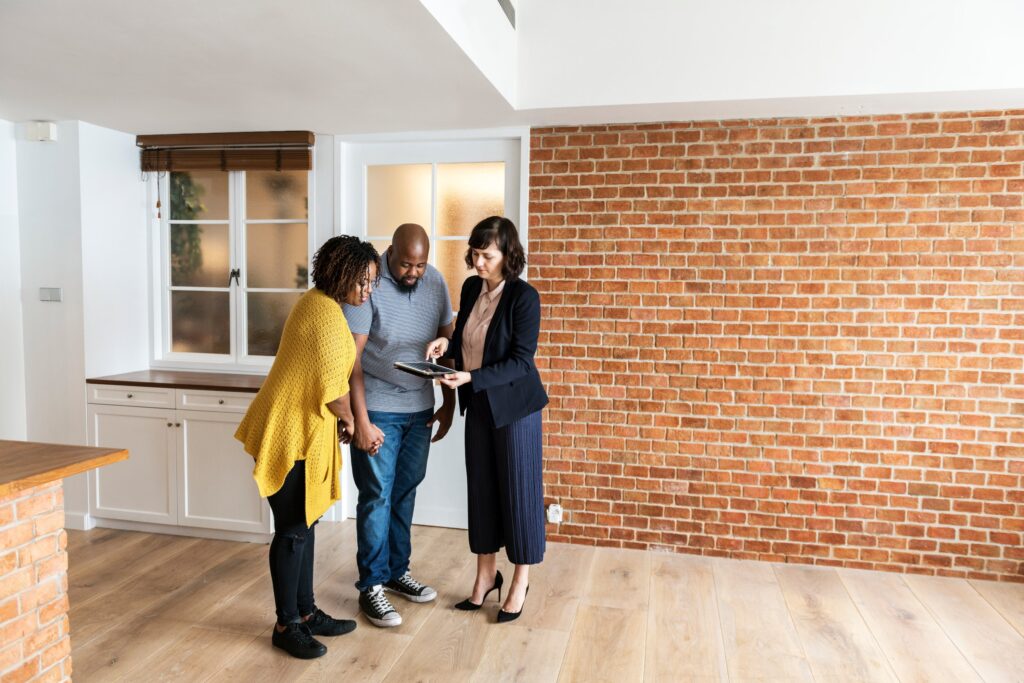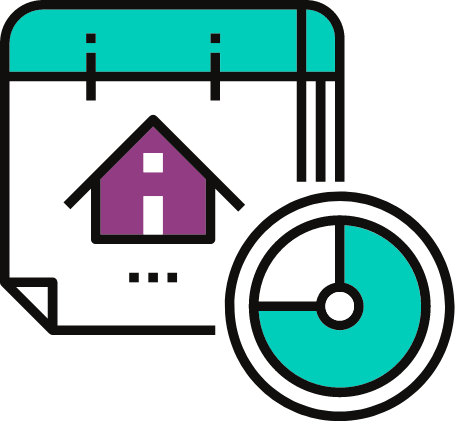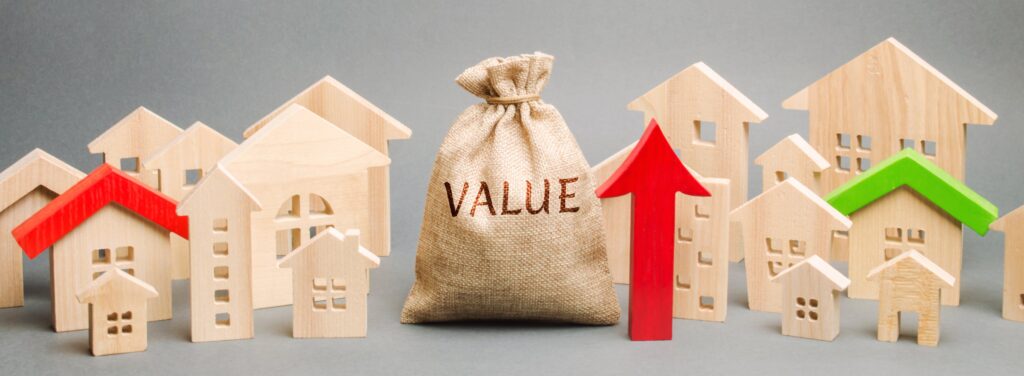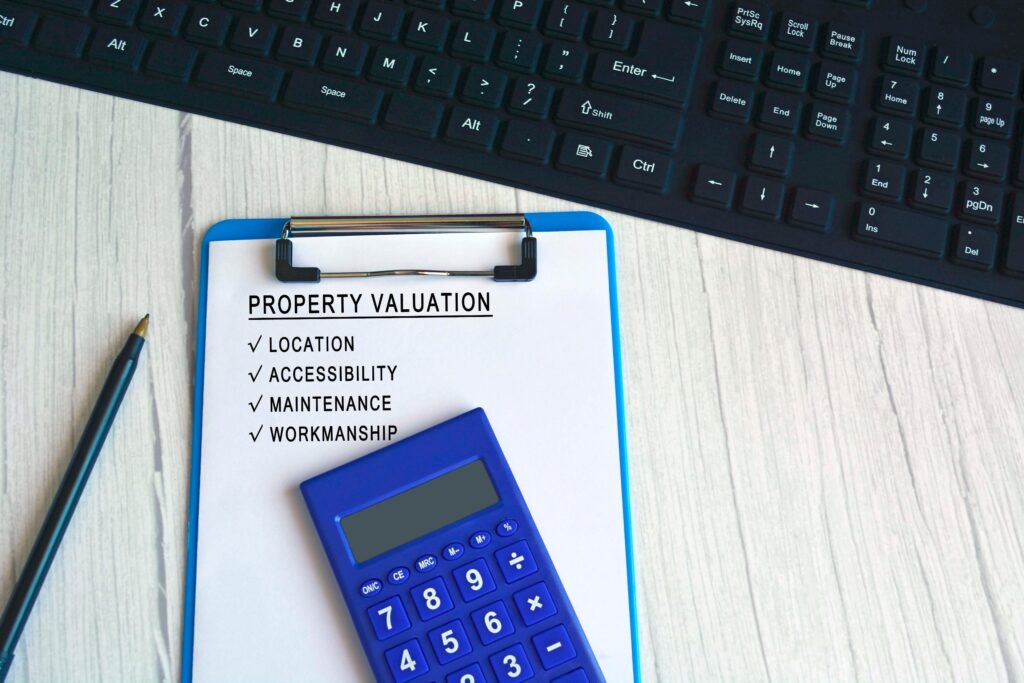
Whether you’re planning to sell your home soon or just curious about how much you could get for your property, there are several ways to gather useful and reliable information. Although you could look at sold house prices in your area to get a rough idea about property prices, getting a professional house valuation will provide you with the best results.
During a house valuation, an expert estate agent visits your house and thoroughly inspects the entire property. The agent examines all features to determine the most accurate amount you can receive for your property.
If you’re not sure what to expect at an estate agent valuation appointment, here we guide you through the entire process. That way, you can prepare for your upcoming appointment and know what will happen.
After the estate agent valuation, you might consider selling your property. That’s where you can use our budget calculator to calculate how much you can spend on buying a new property.
However, for this article, let’s focus on house valuation!
How do you prepare a house for valuation?
Preparing your house for valuation doesn’t have to be anything special, but a little bit of tidying up can do wonders. For example, it’s a great idea to do a spring clean of your entire house before your property valuation agent arrives. Besides focusing only on the main rooms, make sure to take a look at the messier parts of your house, such as the attic, cellar, or garage.
Having your home clean and tidy for the valuation will surely make a good impression on the estate agent. Furthermore, the agent can focus on the key property features without any distractions so that the valuation can be more successful.
In addition to tidying up the house, you should also look at the condition of your exterior. Cutting the grass, sweeping the porch, and making your backyard look good are just some ideas to ensure your estate agent sees the property in its best shape.
Now that your house is ready for valuation, you should also prepare a list of questions you want to ask. Moreover, preparing a list of all the improvements you have made since you bought the property is a good idea.
How long is a valuation appointment?

We understand people are busy with all kinds of obligations and have a lot on their plate even when they’re not trying to sell a home. That’s why estate agents will try to do a proper valuation as quickly as possible.
The exact duration of the valuation appointment depends on the size of your property. Bigger properties require a couple of hours, while small apartments can be accurately valued in about half an hour. Nevertheless, most valuation appointments last about an hour, so make sure to clear your schedule to have enough time to show your estate agent around and talk to them a bit.
Don’t try to squeeze in a valuation appointment on a busy day when you know you won’t be able to dedicate your full attention to the estate agent’s visit. Since precise valuation can do a lot for your property, it’s important to do this step properly.
What do estate agents look at when valuing a house in the UK?

Even though house owners are advised to showcase their property in its best element, good estate agents can see past clutter and other smaller jobs that need to be finished before the property goes up for sale.
That’s because these tiny details aren’t the main concern when valuing a house in the UK. Instead, estate agents focus on the bigger picture and crucial details that could attract potential buyers. For example, an estate agent will consider the size of the property, the number of rooms, the condition of the property, the presence/absence of key elements, such as a fireplace, swimming pool, and much more.
Some common questions estate agents ask house owners during a property valuation are:
- Is the property leasehold?
- Is the property sole or joint ownership?
- What makes your property unique?
- When were the windows last replaced?
- How old is your boiler?
- Are there any structural or maintenance issues?
How does an estate agent value a house?
An estate agent considers several crucial details when evaluating a house. The professional estate agent will examine the geographical area where your property is located. That includes collecting information about the amount of money other properties were sold for in the area.
Besides that, estate agents will also consider the selling history of the area, local property market conditions, and the local amenities available in the neighbourhood.
Once the agent has all the necessary information about the property’s surroundings, it’s time to assess the property and the land. Assessing the land includes evaluating the topography, size, and location, while the potential for future development is also considered.
As for the object itself, exterior and interior inspections are included. Building’s condition, age, layout, design, fittings, and fixtures are all part of the valuation. The estate agent will assess all the object’s features and ask any relevant questions to collect as much information about the property as possible.
Estate agent valuation appointment step by step
If you’re still not sure what the property valuation process looks like, here’s a short step-by-step guide that’ll lead you through the entire procedure.
- Estate agent will behave much like a potential buyer when viewing the property;
- The state agent will inspect every room of the house and the outdoor space while asking questions and noting down important facts about the property;
- After a thorough inspection of the property, the estate agent will calculate the approximate worth of your property using property valuation methods;
- Once you get a response from your estate agent, it’s a good idea to ask any questions you might have been wondering about.
Will the estate agent want me to accompany them on the valuation?
The valuation is an extremely detailed examination of the property, and the estate agent can’t do an in-depth valuation without the help of the property owners. Even though the agents can complete some valuation activities on their own, they need the assistance of house owners for most of the activities.
As you can tell from the questions above and the details estate agents need to collect to do a proper property valuation, a property owner must be present during the valuation process. Not only are they responsible for leading the way and showing all rooms and their features to agents, but they also need to answer all the estate agent’s questions about the property and the area.
Therefore, accompanying the estate agent on the valuation is essential, so make sure to make an appointment and organise your time so you can be present during the valuation.
What happens after a property valuation?
Once your estate agent inspects your home on the valuation appointment and gives you an answer, you can decide what to do next.
Since there are no obligations at this stage, you can simply give up on the idea of selling your home if you’re not satisfied with the offer or put it on hold if you wish to renovate and increase your property’s value.
Another option is to book a different estate agent and receive their valuation, which might be different from the valuation made by the first estate agent you worked with.
When you decide which valuation agent you want to work with, you can contact them and set up a meeting. That’s where the estate agent lists your property and connects you with potential buyers who showed interest in purchasing your property.
How long does an estate agent’s property valuation stay valid?
The real estate market is highly volatile, meaning the prices aren’t fixed. Instead, they constantly go up and down, depending on various market trends. Because of that, no valuation is valid forever. Most valuations stay valid for 1–6 months, depending on where your property is located.
If your property is located in an area that doesn’t get plenty of real estate turnaround or attention, a valuation could be valid for 6 months. Nevertheless, properties located in the zones that attract numerous interested buyers tend to switch trends frequently, so a valuation might not be valid a month later.
Estate agents understand viable market trends best, so they’ll inform you how long your particular property valuation will be valid. Even if you don’t decide to put your property on sale right away, you’ll at least know how much time you have left before you need to schedule another valuation appointment.
How many estate agent valuations should I arrange?
Many property owners make the mistake of making too many valuation appointments with different estate agents. As a result, they quickly get overwhelmed with varying opinions and valuation methods, which only leads to them overthinking the matter.
However, going with the first estate agent you come across isn’t the best choice either, at least not in most cases.
Ideally, you should meet up with two or three estate agents just to have a couple of viable options and see several different perspectives and house valuation methods. Essentially, you’ll have enough choices but won’t be overwhelmed by too many different options. It’s the perfect solution to have some variety without being left confused about what to do next.
In some cases, it’s enough to go with just one estate agent, especially if they come from a reputable and reliable agency. Therefore, if you have an agency you trust, you probably won’t need to get a second opinion.
How to get a higher house valuation

Have you had a recent property valuation appointment that provided unsatisfactory results? Don’t worry – getting a higher house valuation is possible if you dedicate some time and effort to your property.
If you’re lost on how to increase your house valuation score, here are some helpful ideas:
- Tackle those issues – structural issues, electricity issues, water system issues, and any other negative features found on your property are likely the reason your property got a lower score in a valuation. Fixing these issues can make a world of difference.
- Remodel the space – old properties can quickly get a higher house valuation with just a few upgrades. Consider remodelling parts of your home to make them respond to current living trends. For instance, open-plan spaces are in high demand right now.
- Add additional rooms – adding extra rooms to your property will instantly bump up your house valuation score. However, that doesn’t mean you have to expand your house. Sometimes, converting the cellar or garage into an additional room is more than enough to reach the desired price for your property.
House valuation preparation checklist

Property valuation is so much more than regular house viewing. Since the estate agent will go into great detail concerning various features found on your property, it’s useful to make a house valuation preparation checklist. Here’s an example of a preparation checklist that ensures your house valuation goes over smoothly:
- The total size of the house and land;
- The age of the property;
- The year when the windows were last replaced;
- The year when the roof was last replaced;
- The age of the boiler;
- Plumbing and electricity details;
- Leasehold details;
- List of all the special features on the property;
- List of all structural or maintenance issues.
Conclusion
Property valuation is the best way to find accurate information about your property’s current value on the market. Whether you’re seriously considering selling your home or not, it’s never a bad idea to know how much you could profit from selling your property.
Here at PropertyPriceAdvice, we offer you a free house valuation tool you can use to receive the crucial information you need regarding your property and plan your future decisions accordingly.